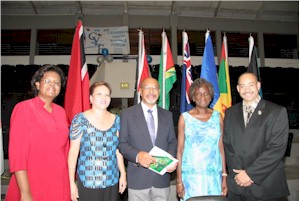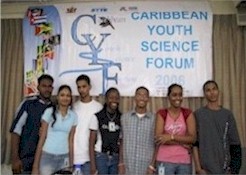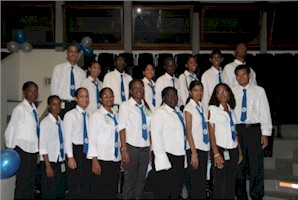CYSF - The Caribbean Youth Science Forum - got off to a rousing start on Sunday 30th July 2006 at the Auditorium of the School of Continuing Studies, UWI, St. Augustine. Mrs. Maureen Manchouck, NIHERST President, was visibly proud in her welcome to some 240-odd participants from nine countries of the Caribbean at this, the fifth staging of the Forum.
Since its inception in 1999, the Youth Forum continues, with the support of the Ministry of Science, Technology & Tertiary Education in Trinidad & Tobago, to grow in its popularity and its reach within the Caribbean region. Mrs. Manchouck referred to the Forum as a “popular August holiday destination” for lower sixth form science students of the region. Confident that the participants were, “not just here for the lime”, a statement that elicited many chuckles from the audience, she stated that the event was designed to provide a range of opportunities to support the educational and personal development of students.
In her welcome, she highlighted two key facets of the annual event, which keep students excited and interested about science and technology. Firstly, she underscored the Forum’s debates, which encourage research and heighten students’ critical thinking abilities. Secondly, but no less important, she drew attention to the social and cultural activities – these provide balance and entertainment and strengthen the sense of connectedness among the participants from the various Caribbean countries.
Mrs. Manchouck emphasised the regional need for citizenry that are more knowledgeable in science and technology and noted that undertakings such as the CYSF could go a long way in addressing this need.
Feature speaker at the opening ceremony, Dr. Andre Cropper, mesmerised his audience of youngsters and guests alike, in a guided tour of the innovation process from his personal experience. Technology Development Manager at ITT Industries Space Systems Division in Rochester, New York, Dr. Cropper examined various forms of innovation - discoveries, traditional and accidental – which take an innovator from “ideation” to “creation”.
He spoke of the various sources of inspiration and nurturing of creativity, citing examples from his family interaction, his experience as a young, outstanding national swimmer and his exposure to artists and artisans. Dr. Cropper underscored the fact that everyone has the ability to innovate, and encouraged youngsters to talk to and emulate their elders, to watch and listen to their surroundings, and to constantly enrich their learning and innovative possibilities.
He then gave a brief introduction to some examples of traditional and accidental innovations, including marble sculpture, the steelpan, reggae, doubles and the development of one of his pet projects with OLEDs – organic light emitting diodes. He closed his stimulating address by encouraging the audience to pursue innovation through its various steps: embrace it, formulate it, and execute it.
The audience was then treated to what may have been a foretaste of the Forum’s traditional Caribbean Night fare, in a dynamic and witty Speech Band performance from students of the Signal Hill Comprehensive School. Dressed in their colourful jester-like costumes, the team spoke on “ The Forum: Past, Present and Future…in continuation”.
The three stanzas melodically delivered quick comments on the value of the event in strengthening S&T in the region, the renowned ‘sweet hand’ of the caterers, and special thanks to the hosts and organisers of this year’s Forum. Needless to say, the appreciative audience rewarded the performers – including two proficient female drummers - with a lusty round of applause, which followed them off stage.
Emeritus Professor of Plant Science, Professor Julian Duncan declared the Forum open. Professor Duncan, in his brief remarks, applauded NIHERST for its commitment to hosting of the CYSF, which continues to introduce and encourage interest in science and technology interest amongst our youth. He stated that Dr. Cropper, the feature speaker, has served to underscore to the youth, the fact that the Caribbean is well able to produce innovative and inventive scientists.
Professor Duncan reminded the audience that previous revolutions, such as the industrial, green and gene revolution, have all been driven by innovation. He warned that whereas Caribbean people tend to be somewhat complacent with the dependence on oil, gas and tourism, the fragile nature and vulnerability of our region to epidemics and natural disasters, should stir us to greater innovation to deal with these realities. In formally declaring the event open, Professor Duncan encouraged the students to make the best use of the opportunities presented during the week of activity.






